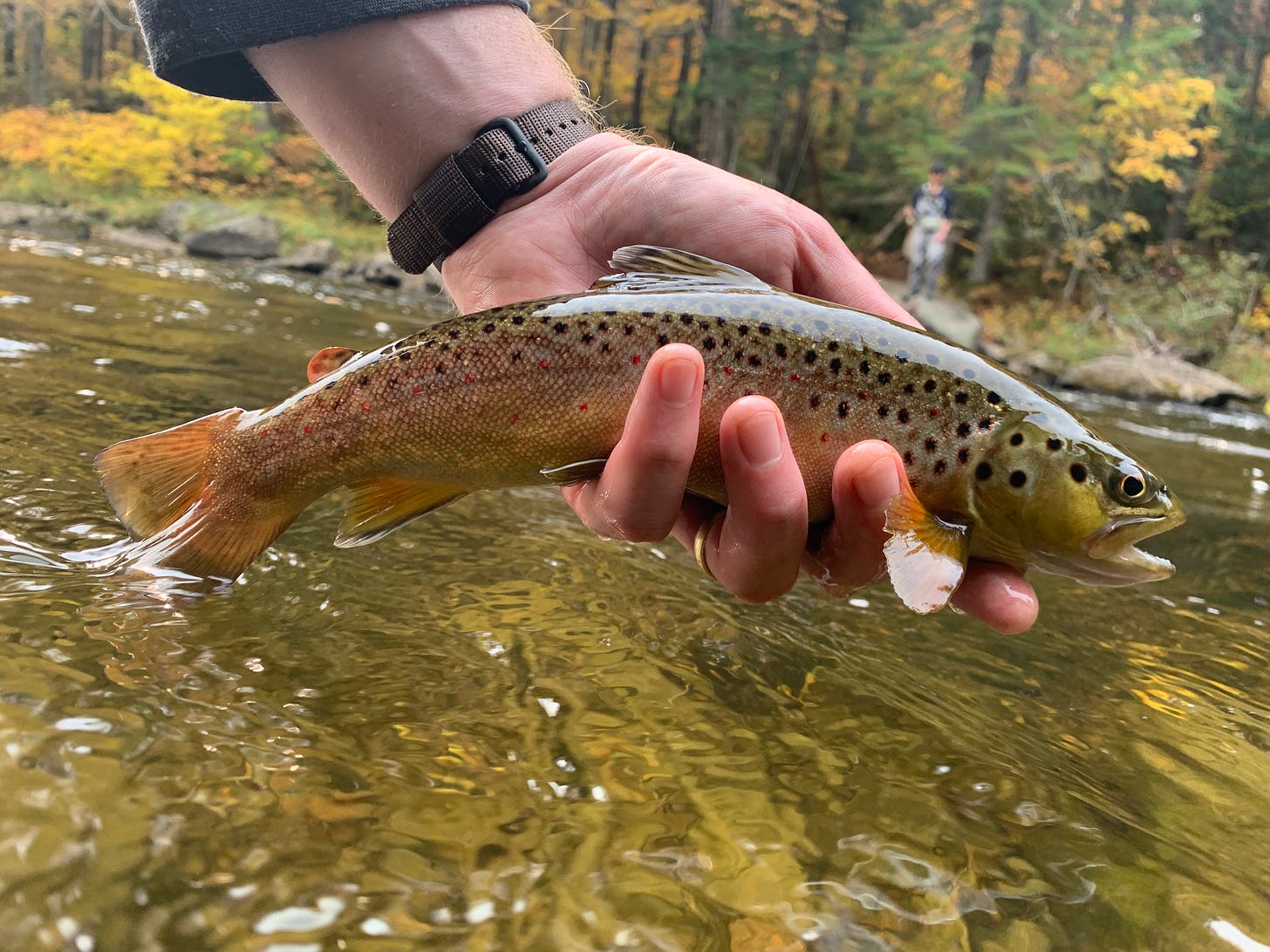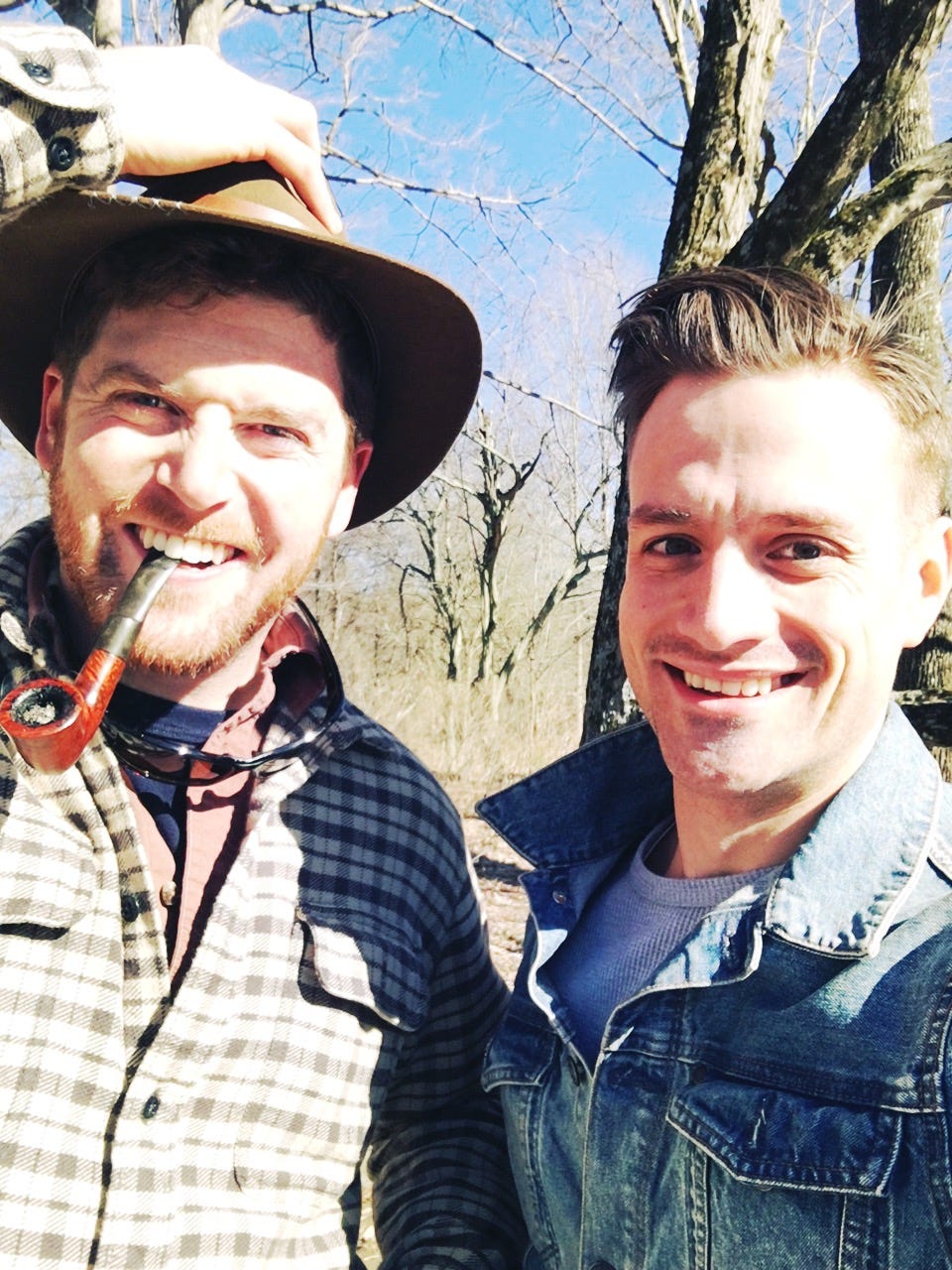Attempting to predict how you’ll react when you hook the fish of a lifetime is a futile pursuit. You’re never ready when it happens. It’s a snag, you think. Maybe you’d curse at another lost rig. But then something curious happens; motion where there should be dead weight. That realization is tectonic, and then everything shifts. The neurological avalanche that ensues is as exhilarating as any drug, more pure than any religious experience.
When Adam hooked his brown trout, he reacted as honorably as any one of us could hope to.
We had spent the morning working upstream along a familiar piece of water, fishing in a loose proximity such that communicating vocally over the sound of the water was fruitless. So we spoke in the language of facial expressions and hand signals gained over countless seasons of fishing together; since the beginning, really.
We leapfrogged one another, working through nice runs that held the typically-sized holdover stocked rainbows. Fun fish that don’t make you work too hard. When we hit the first decent pool, we watched for risers. I spotted one at the head on the far side, so I crossed the shallow tailout and stalked up behind it to within casting distance and watched. I could see blue wings hatching — little ones, maybe #18. I stripped the nymph rig off and tied on a foot of mono tippet to which I knotted a BWO emerger. He took, and Adam and I exchanged a grin across the river as I brought the plump brown trout to hand.
Rather than work all the way back down the pool to cross the tail out once again, I stayed on the far side. This piece of water, a popular destination in the Northeast, has, at any given time, a well-trodden path running alongside it. It took us a few seasons to know where to cross so that we could fish the runs from the good side, and how to avoid the sections where the trail is grown in with thick shrubs that prick elbows and poke unprotected eyes. A blazed trail is a creature comfort easily scoffed at when you’re searching for an escape in the woods, but a godsend when you’re wearing waders that don’t yet have holes in them.
The far side was feral, and though I was able to force my frame through thickets, I was regretting my decision. We picked up a few more small fish – more rainbows – hailing each as we went with a shout and a thumbs up. Every so often I’d stop and watch Adam fish and skip along the shore. I envied his agility but couldn’t help but smile as he hopped from one slick boulder to the next, stopping occasionally to flip a cast into the broken water between us. This was his favorite type of water and he fished it with the skill that only a lifetime of practice can produce. Child’s play.
Adam and I met when he was a first year law student and I was fresh off a long stint of military training. Though I had fished conventionally most of my life, I had never tried fly fishing. Adam had a vise on his desk, clamped to the only spot that wasn’t covered in textbooks and atlases of New England. He invited me out one day and gave me a handful of Elk Hair Caddis. I didn’t even know how to tie a knot. That was the beginning of everything.
Upstream, the river took a right-hand bend that pushed wide to my side which created a soft slick under a thicket of willows. It was late afternoon and the Olives were hatching more consistently now, with some caddis popping too. My success downstream urged me on through the scrubby shoreline. I got low and tucked along a deer trail until I found a place to punch through to the water. I did, and rejoined Adam just in time to work the run together.
Angler’s are, generally, perfectly equipped for solitude. Inviting someone to share in the little slices of peace that fly fishing offers us doesn’t come naturally. There’s a delicacy to fishing with others, balanced on attitude, physical ability, and technical proficiency. Over a decade of fishing together, Adam and I have developed a tandem approach that we loosely refer to as ‘eyes and judgment.’ Sometimes it’s literal: As a lifelong hunter, Adam has an uncanny eye. My vivid imagination merely keeps us from wading too deep in unfamiliar waters.
But mostly, it’s a symbol of how we augment each other on the water. He’s affable and generous. I’m hot-tempered and stubborn. He moves when he fishes, as is the way in the Adirondack streams where he was taught to fish by his grandfather. I post up, dead set on catching the fish I can feel in my bones is hiding in plain sight. He likes broken water that you can read, or where you can dance a streamer through the rocks. We often fish in tandem, taking turns fishing and watching, exchanging ideas, working the water as Holmes and Watson might a mystery. An ongoing conversation in this strange language we both call our mother tongue.
I did not see him make the cast, or set the hook. But when I did look up, he didn’t have to say a single word. The saucers that had replaced his eyes told me everything I needed to know. In an instance he was off, stiff arming the rod above his head while hopping down the rocky bank in pursuit.
Sometimes big trout run, sometimes they sound. Sometimes they shake their heads in a frenzy of instant regret. Sometimes they come unbuttoned before you get to experience their full might, or break you off so efficiently you could swear they’re packing a pair of nippers. But really smart big trout just sort of back away, flaring their pectoral fins like air brakes and letting the current carry their mass downstream in a powerful, yet subtle, escape.
I scanned the water between us, searching for a way across. He yelled something that translated roughly to ‘help!’ as I watched him — half in horror, half delight — get dragged downstream, around the bend and out of sight. It was clear that he’d hooked a monster, and that it had the upper hand.
Moonwalking is a technique reserved for the hairiest of wading scenarios. It’s a method to cross a deep spot or a piece of current that’s too strong to stand in by letting the natural buoyancy of your body and the air trapped in your waders carry you like an astronaut in the low gravity of the moon. It’s the Hail Mary of riparian navigation, and works about as often.
When I reached the other side of the river, Adam’s side, I didn’t stop. I found the trail and ran downstream. I could see Adam through the trees, still wrestling the trout, the two sliding ever downstream. I unclipped my net before ditching my rod and vest in a bush and chased after them. It took fifty yards for me to catch up, another fifty to eclipse them and find a place where landing was possible. The first attempt was stymied; just as I stabbed my net into the current the trout slid away from me and surfed a tongue of white water down to the next hole. I hit a rock and heard a crack.
But I had seen him. Big and muscular, with spots like black nickels against the autumnal blush of his broad sides. And now we were close enough to communicate. The trout didn’t know it, but the odds had shifted in our favor. Adam kept working him and I reset, the two of us herding the fish toward a sandy shallow. I stabbed again. He dodged. My net hit the bottom and snapped. But this time he slid left, toward the soft pocket. Adam deftly picked up slack and lifted his head. I stepped up, grabbed the broken hoop of the net and scooped with all my might.
In the quiet aftermath, as we sat in the sandy shallows, watching the river reclaim its calm, the magnitude of what had transpired settled over us like the gentle dusk. The fish, magnificent and momentarily ours, was now a shared memory—a testament not just to the thrill of the catch but to the unspoken bond it had fortified. This experience, woven from the fabric of countless casts, laughs, and silent acknowledgments, transcended the mere act of fishing.
It was a vivid reminder of why we return to these waters: not solely for the fish we hope to catch but for the moments of unguarded joy and the deep, enduring connections they foster. In the end, the true catch wasn't the trout, nor was it the broken net — it was the realization that in the pursuit of these fleeting encounters, we find something infinitely more valuable; a piece of ourselves, mirrored in the water, in our companions, and in the stories that ripple outwards, long after the day fades.






Beautiful fish and great story. Congrats!